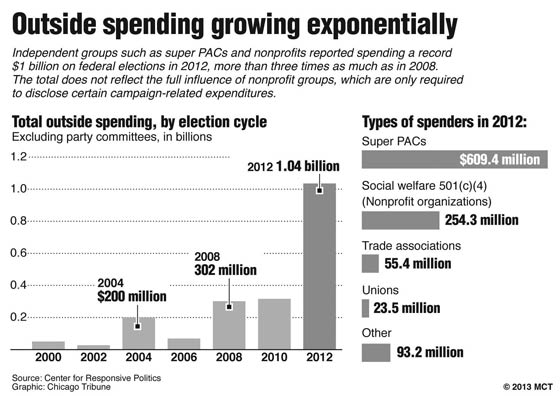Senate upholds billionaire’s ability to buy our elections
September 19, 2014
Despite public disapproval, the Senate chose to keep the Citizens United ruling in place earlier this month. In other words, there is now no limit to the amount of money corporations and unions can spend on political ads and other tools to sway public opinion during elections.
Showing how split congress is, 54 Democrats and Independents voted in favor of a bill overturning the controversial ruling while all 42 Republicans voted to keep it, according to vox.com. Despite the majority vote in favor of overturning, the bill needed at least 60 votes to carry.
In 2010, the Supreme Court ruled that it was unconstitutional to ban the free speech of corporations and unions, effectively allowing those entities to support or attack candidates through advertising. They also eliminated any limits on how much these groups could spend.
“While the Senate vote was a victory for Republicans, it was a defeat for American democracy,” said Sen. Bernie Sanders (I-VT), one of the most devoted advocates for reform. “The Koch brothers and other billionaires should not be allowed to spend hundreds of millions of dollars electing candidates who represent the wealthy and the powerful.”
He is absolutely right. The 1 percent should not be allowed to spend vast sums of money to elect candidates that neglect the needs of 99 percent of the population. This begs the question; is this a democracy or oligarchy? Is it truly the people who have the power? Or is it really the wealthy who have the power?
The amount of money spent on elections since the ruling for Citizens United in 2010 answers that question. The 2012 presidential election was the most expensive history, with over $1 billion dollars spent by non-party outside groups, according to opensecrets.org.
Despite these staggering figures, the opposition to overturning Citizens United argued that limiting spending on corporations and unions is taking away their first amendment right to free speech. They claim that by not limiting spending by corporations it gives every candidate their best chance to get their message out, according to the Center for Responsive Politics. But isn’t this doing the exact opposite? By allowing corporations to spend unlimited amounts on select candidates, the other contenders are left in the cold because their advertising dollars cannot match those backed by the 1 percent.
For example, think about a candidate who is running for Congress. She has wonderful ideas, but doesn’t have corporate backing. This leaves her and her staff with a small budget from which to spend. When campaigning, they could only afford a couple commercials. At the same time, another candidate runs for the same spot, but has corporate backing. This allows them to have hundreds of commercials. Which candidate do you think has the best chance of winning?
This hypothetical election is happening all across America right now. With unlimited spending, corporations and unions are selecting candidates that will protect their interests.
“If we cannot control billionaires’ power to buy elections, the people elected to office will be responsible to the needs of the rich and powerful, rather than the needs of everyone else,” Sanders said.
The American people need to step up locally and overturn Citizens United. We need to cut off the link between politicians and corporate backers. Already, 16 states have made local laws to limit campaign spending, according to the Huffington Post.
Despite the 3.2 million signatures turned in for a petition to rid the nation of Citizens United, the Senate has failed again to fight for the people. With many of them up for re-election, lets show them who has the real power and vote in leaders with interests for the people, not the 1 percent.
The buying and selling of politicians needs to stop. The buying and selling of America’s future needs to stop. We need to take the money out of politics. We need a true democracy where the issues and interests of the people are represented and not the interests of corporate backers and their hired puppets.































